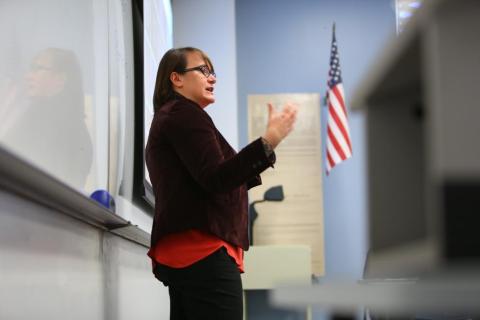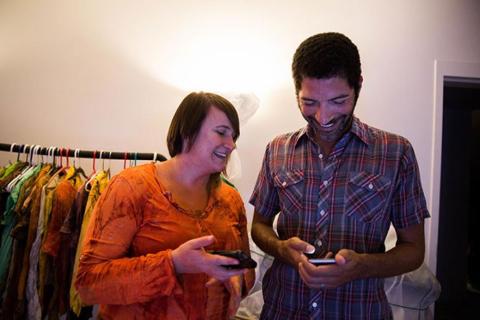Multitasking with Jacqueline Wernimont, Digitrix
Jacqueline Wernimont, Assistant Professor of English, is a force of nature—and numbers.
As both a literature scholar and digital humanist, Wernimont is engaged in no-less-than-four interdisciplinary digital humanities (DH) projects. She is also simultaneously completing her book manuscript, Quantified Lives: A History of the Media of Measure, a “new media history of the tools, technologies, and interfaces that we use to count, measure, and weigh our bodies, our selves, and our lives.”
Some of the collaborative digital endeavors in which she participates include the Eugenic Rubicon—a historical data and storytelling project funded by the National Endowment for the Humanities that documents forced sterilizations in 1930s California; Vibrant Lives—an arts and performance-based collaboration which seeks to literally embody the data we use and shed; and Center for Solutions to Online Violence —an initiative funded by the Digital Media and Learning competition that works to address harassment of women and feminists of all genders.
Another project, the Human Security Collaboratory (HSC), which she co-directs, investigates how human data is used as “invisible labor” in service of the corporations who harvest it. The HSC is an arm of ASU’s Global Security Initiative, which draws scholars from, according to an ASU News story, “computer science and business to law, psychology and even the English Department.”
“Yes, even English,” says Wernimont wryly. Indeed, from the outside, it may seem a stretch for a literature scholar to specialize in tech, but the scope of Wernimont’s work shows how valuable a humanities perspective can be.
Fittingly, we caught up with her via email—“on the fly”—while she attended the Digital Humanities Summer Institute at the University of Victoria, British Columbia, this June, where she answered a few questions.
Accents on English: How would you define “digital humanities” for a non-academic audience?
Jacqueline Wernimont: A range of practices that bring humanities questions about culture, art, society, and production together with digital tools.
AoE: Your training is in 16-17th-century literature (yes?). How did you develop your interest in digital humanities?
JW: Answer: I began working as an encoder at the Women Writers Project, which was then at Brown University, while still taking classes in graduate school. It gave me a bit of weekend cash as well as a chance to work in a new environment and with a new set of tools, but still in within my period of expertise. I learned a great deal about DH in that job, and even more once I took over as the project manager and textbase editor. I've been working in the field from about 2005 pretty actively and the [Women Writers Project] gets all the credit for introducing me to it.
AoE: Does ASU offer anything better/different/more helpful for digital humanists than do other universities?
JW: There are very few certificate programs in the U.S. for graduate students, so ASU’s Digital Humanities Certificate is unusual in its very existence. Additionally, we have a strong set of connections with folks in the School of Sustainability (SOS), School for the Future of Innovation in Society (SFIS, and School of Arts, Media and Engineering (AME), which makes our interdisciplinarity quite robust. Then there's a strong commitment to social justice issues within DH in our program that draws a lot on our local expertise with Native American and Latinx communities.
AoE: Your investigations into the ethics of algorithms and “big data” are timely, especially considering recent events like the unveiling of oodles of smart-phone connected personal tech, the leak of Facebook’s “trending” curation directives, and Apple’s refusal to hack its iPhone for the FBI.
How do you see your myriad projects contributing to deeper understanding of the topic/issues?
JW: Each of my projects is invested in finding ways to enfranchise people with respect to digital technologies and practices—so ensuring that people who wish to have access can and those who wish to opt out may do so as well. I hope that we create a future for ourselves where living a vibrant life within digital culture is possible for all.
AoE: Do you see any dangers in too much connection? Too much data? Is there a way to protect ourselves from ourselves?
JW: I don't think connection or technology writ large is problematic—worth understanding and critiquing—but not inherently problematic. So I wouldn't say that I think too much connection is inherently dangerous. I do think it's worth understanding what we are choosing to do when we are connected, how the technologies and interfaces shape what we can/cannot do, and what we've chosen not to do when opt to check our Facebook page or the like. Part my emphasis on understanding is that people need to know what convenience costs them—if you're not paying for something with money, you’re paying with your data or access to your devices. That is often deliberately hard to see and doesn't allow people to make choices, so I think we need to be mindful of the processes and people that make our tech, the ecologies in which we use them, and the impacts of all those interactions.
Image 1: Jacqueline Wernimont teaches her spring 2016 class, ENG/FMS 494: "Possible Worlds in Literature and Video Games." Photo by Bruce Racine.
Image 2: Wernimont shows the app her team developed for the October 2015 "Vibrant Lives" performance to SHPRS faculty Matt Delmont. Photo by Deanna Dent/ASU Now.
A video by ASU Now shows several moments of the "Vibrant Lives" performance last October. Wernimont is in the first frames of the video.


